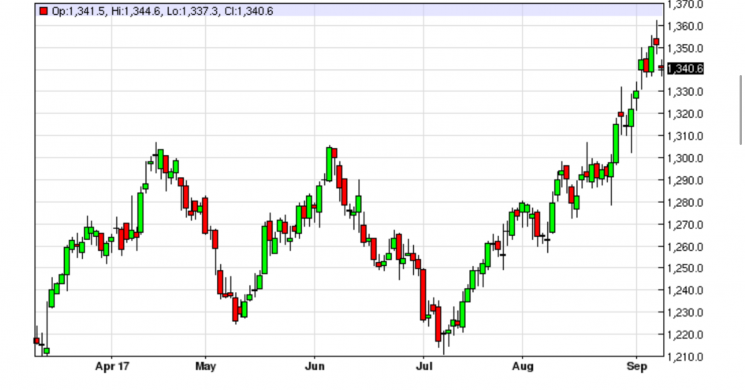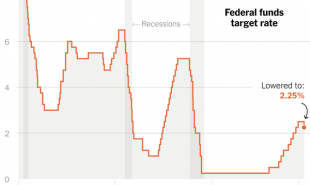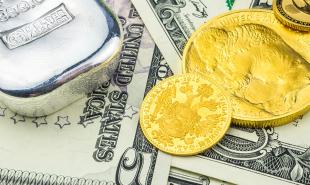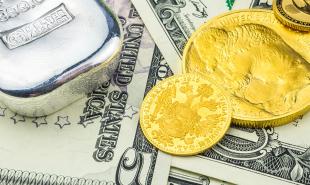
Somebody please tell the Cassandra buyers to buy when they can. Not when they have to. They are killing Gold as a proper hedge for the rest of us.
We are now looking at a metal hostage to event driven buyers, who upon seeing no falling sky will liquidate first chance they get.
Gold is as of the moment news driven on higher moves. And non-news driven on lower ones.
As of this morning Gold for Spot delivery is trading $1335 approximately $10 off Friday's close. That puts December futures at $1340 and change.
We were warned by several of our own indicators, most notable was the lack of chance gold got to catch its breath on early Friday morning as it rocketed up to new highs of $1362.40 before running out of steam.
In retrospect Friday's buying was likely panicked money wanting to not go home that weekend without some sort of exposure given all the potential events. People bought for all kinds of reasons we imagine. And those people bought when they had to, not when they could. The result is self-evident.
Nothing has changed, North Korea is a nuclear threat, the debt ceiling is kicked down the road and one of the fallouts of the North Korea situation is there is no military solution we can initiate without jeopardizing the whole peninsula.
To make matters worse, China basically said if the US did try something "first" it would come down squarely on the side of Noth Korea.
So the world is moving towards increasing polarization, but since it didn't end this Saturday, it's safe to sell gold. Go figure.
All this translates into a tenuous range between $1348 and $1335 basis December futures today. A globally destabilizing event will be the likely cause of a breach higher, while no news will encourage a continuation of the push lower we warned of Friday and yesterday.
December futures daily is looking "shooting star-ish".
(Click chart for updates)
The 4 hour spot chart is doing what it should, with an eye to move lower as a hostage to time.
Irma's intensity weakens as it moves up Florida coast, North Korea's failure to launch, and the U.K.'s Great Repeal Bill faces a vote.
Irma weakens
After making landfall in the Florida Keys yesterday morning as a Category 4 storm, Hurricane Irma weakened as it traveled through the state’s west coast, with the latest reports downgrading it to a Category 1 storm with top winds of 85 miles per hour. Estimates for the total damage have dropped to $49 billion from as high as $200 billion. For the Federal Reserve, the storms that have battered the southern United States are making it more difficult to read the economy’s pulse, with William Dudley, president of the New York Fed, warning that it could affect the timing of short-term rate increases.
North Korea doesn't launch
Fears that Pyongyang would launch another missile test over the weekend, which had added to last Friday’s market selloff, proved overblown, with North Korea instead issuing threats against the United States ahead of a vote in the United Nations on further sanctions. While Japan has backed a U.S. proposal to target the country’s oil supplies in the U.N. vote, it remains unclear if China or Russia will veto the proposal. South Korea, meanwhile, continues to push for a diplomatic solution with its poorer northern neighbor.
Markets rise
The less-severe-than-anticipated developments in Florida and North Korea over the weekend have spurred a market rally this morning, with the dollar recovering from a 2015 low, while Treasuries and gold weakened. Overnight, the MSCI Asia Pacific Index gained 0.6 percent, while Japan’s Topix index closed 1.2 percent higher amid a selloff in the yen. In Europe, the Stoxx 600 Index was 0.9 percent higher at 5:40 a.m. Eastern Time, while S&P 500 futures had added 0.6 percent.
Brexit vote
Late tonight U.K. time, the House of Commons will vote on the Great Repeal Bill, designed to ease the country’s exit from the European Union. A victory for Theresa May’s government seems likely, presuming her own party members pledge support for the contentious piece of legislation en masse. The vote will kick off what should be a busy week for pound traders, with inflation and retail price data tomorrow, ahead of the Bank of England decision on Thursday.
China inflation
Producer-price inflation accelerated to 6.3 percent in August, ahead of economist predictions for a 5.5 percent increase in the world’s second-biggest economy. The strong reading comes as Beijing’s policy of limiting capital outflows continues to bear fruit. China is also piling pressure on cryptocurrencies by banning them entirely from exchanges, according to people familiar with the matter, while allowing over-the-counter trading to continue.
Read more by Soren K.Group







